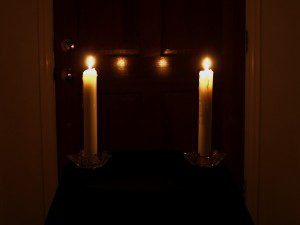 Initiation is a rite of passage that facilitates and confirms a change in the status of an individual. That definition sounds simple, but in many (perhaps most) Pagan traditions initiation is shrouded in mystery and filled with expectations.
Initiation is a rite of passage that facilitates and confirms a change in the status of an individual. That definition sounds simple, but in many (perhaps most) Pagan traditions initiation is shrouded in mystery and filled with expectations.
Over on Raise the Horns, there’s a three-part series from a guest poster on initiation in British Traditional Wicca. It’s more about the three-degree system than the initiations themselves, but it’s still worth reading. I’ve written a few posts on initiation, including this general discussion, this one on planning initiations, and this one on how we went about planning a very specific initiation in 2012.
In my own work I’ve drawn heavily from this essay by Isaac Bonewits. Isaac said (and I agree) there are three types of initiation: the recognition of a status already achieved, a method for transferring spiritual knowledge and power, and an ordeal of transformation.
It is the topic of ordeals I want to explore today.
An ordeal is “any extremely severe or trying test, experience, or trial.” This is the common definition of the word, but when discussing initiatory ordeals it is necessary to add “for a specific and valid purpose.” Without a specific and valid purpose, an intentionally-caused severe experience is hazing. Without a specific and valid purpose, an unintentional severe experience is simply the randomness of life.
Ordeals test the initiate
Imagine you’re a young person in a hunter-gatherer society. You’ve heard the stories of the hunters, you’ve handled the spears, you’ve seen the hunters work to bring down the large animals that feed you and your tribe. You’re now at the age to join in the hunt. Are you ready? Can you hold your ground in the face of a raging animal? Until you do it, you’ll never know.
 If we’re going to acknowledge you as a master of our craft, is your work good enough? Does your needlework or woodwork or smithcraft meet our standards? Can you compose and deliver a poem in proper form? Can you demonstrate the current state of the art in surgery?
If we’re going to acknowledge you as a master of our craft, is your work good enough? Does your needlework or woodwork or smithcraft meet our standards? Can you compose and deliver a poem in proper form? Can you demonstrate the current state of the art in surgery?
Can you be trusted with sensitive secrets? In the mythology of witchcraft, an ordeal was designed to insure that if an initiate fell into the hands of the witchfinders, she would not give up the rest of the coven. The concept is ahistorical, and in practice victims will tell torturers whatever they think they want to hear whether it’s true or not. Still, the myth remains, and ordeals can verify whether or not a candidate is trustworthy.
Ordeals transform the initiate
Our educational system tells us learning is slow and deliberate. It requires instruction, study, and practice. It requires reading and thinking – a lot of thinking. Those are good things, and as someone with two college degrees and a house full of books, I highly recommend them.
But some things can only be learned by experiencing them. They are ineffable – unspeakable – because words and language are inadequate to describe them. An ordeal enables learning by doing, where there is no other way to learn.
More relevantly, some things can’t be learned in an ordinary frame of mind. As I frequently bring up when discussing magic or spirits or Gods or anything else outside the realm of consensus reality, people will only see what their belief system tells them is possible. Anything else will be ignored or rationalized away. The stress and fatigue of an ordeal can break down the intellectual barriers we put up and allow us to see and hear and feel the presence of a greater reality.
I was 19 when I experienced my first ritual ordeal. The details are oath-bound, but I can say that while it was extremely stressful, it was also successful. The concepts I understood intellectually I learned emotionally. To this day, when things get bad I can remember a time when I thought my world was ending – and it didn’t. There are many reasons why I continually recommend sticking with tasks that are difficult and unpleasant but also necessary – that ritual ordeal is one of them.
Planning Ordeals
Some initiations include traditional ordeals, rites of passage that have been passed down from generation to generation. But for those of us who work in less established traditions, we’re frequently asked to create initiation ceremonies from scratch. Doing that well is a lot of work. But it presents the opportunity to tailor the experience to the candidate.
While I’ve led several initiations with ritual challenges, I’ve shied away from ordeals. This is partly because the candidates didn’t seem to call for an ordeal. It’s also because an ordeal carries the risk of failure, and to be blunt, I didn’t want to have to deal with the aftermath of a failed ordeal. Did I do the candidates a disservice? In most cases, no. In one case, perhaps…
 There is also real, physical risk in an ordeal. An ordeal that can’t be failed isn’t an ordeal, no matter how difficult, stressful, or painful it is. Keep in mind there’s a huge difference between a challenging ordeal and a stupid ordeal. Remember James Arthur Ray, the New Age guru who killed two of his followers in a sweat lodge that had been heated to ridiculous levels. Beware the temptation to make ordeals big and bad for the sake of making them big and bad. A good ordeal is judged by its effectiveness in creating transformation, not by the amount of blood, sweat, and tears it leaves on the ground.
There is also real, physical risk in an ordeal. An ordeal that can’t be failed isn’t an ordeal, no matter how difficult, stressful, or painful it is. Keep in mind there’s a huge difference between a challenging ordeal and a stupid ordeal. Remember James Arthur Ray, the New Age guru who killed two of his followers in a sweat lodge that had been heated to ridiculous levels. Beware the temptation to make ordeals big and bad for the sake of making them big and bad. A good ordeal is judged by its effectiveness in creating transformation, not by the amount of blood, sweat, and tears it leaves on the ground.
Unplanned Ordeals
Like all spiritual experiences, ordeals are unpredictable things. Sometimes they occur spontaneously. There have been numerous times, in my own life and in the lives of those around me, when a candidate has been approaching initiation and all of a sudden Things Start Happening. Difficult things. Unpleasant things. Challenging things.
It’s like the Gods (or at least one or two of Them) say “You want an ordeal? OK, we’ll give you an ordeal.”
When I approached my first Pagan initiation, I was inundated with calls to turn back. For about a month before the ritual, I think I must have channel-surfed onto every TV preacher in existence, all of them talking about how everybody but them was going to hell. I grew up in that kind of environment, and while intellectually I had rejected it long ago, emotionally it still had a few tentacles stuck in me. I had to get past my fear.
I spent some time in what I’ll call a high-wealth environment. When I was younger, I really struggled with wanting all the things I was “supposed” to have. Being in that environment told me I should be spending my time on making money instead of silly things like religion and spirituality. I had to get past my materialism.
And I spent some time with some folks who I dearly love, but who’ve lived their lives according to other people’s rules and other people’s priorities. This called me to just keep slogging along, don’t take any chances, don’t expend any great effort, take the path of least resistance. I had to get past my own inertia.
In the end, I had to choose. I hate the way the word “choice” has been twisted to imply that many options is a good thing even if all of them are bad, but in this case it was a clear choice between two very different futures. I was standing at a threshold and I had to either step across the line or turn back… and I was left with an indefinite but strong impression that if I said no, this choice would not be presented again.
I said yes and I’ve never regretted it. The initiation itself was a strong experience – particularly the investiture – but that unplanned ordeal is what transformed me from a curious seeker to a committed Pagan.
For a specific and valid purpose
Beware the tendency to label life’s random unpleasantness or the consequences of your bad decisions as ordeals. An ordeal isn’t just anything hard and stressful. It isn’t just anything that teaches you something, even something valuable. An ordeal is something that’s hard and stressful for the purpose of testing and transformation.
It’s natural to look for meaning in suffering. But when we insist on assigning meaning to something that is truly random, it leads to bad theology. It leads to believing “it’s all about me.” It leads to seeing the Gods as cosmic life coaches instead of as independent beings with Their own goals, interests, and areas of responsibility.
Tarot artist and author Robin Wood says “The Gods initiate. We just officiate.” Creating initiations and facilitating ordeals is a great honor and a great responsibility. May we be worthy of the traditions we continue, and the traditions we begin.
















